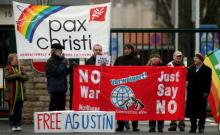Peace and Nonviolence

JERUSALEM — The U.S. State Department is advising visitors to Jerusalem to dress modestly when visiting certain neighborhoods, or to avoid the areas entirely, in hopes of not provoking local sensitivities.
The State Department guidance did not specify which neighborhoods are considered problematic, or what, exactly, constitutes "modest" attire.
The Jerusalem advisory, updated on Jan. 10, says travelers "should exercise caution at religious sites on holy days, Fridays, Saturdays, and Sundays" and "dress appropriately" when visiting ultra-Orthodox Jewish neighborhoods and the Old City of Jerusalem, where religious Jews, Muslims and Christians live in distinct quarters.
![Secretary of Defense Leon Panetta in October 2011 via Wylio [http://www.wylio.com/credits/Flickr/6210921998] Secretary of Defense Leon Panetta in October 2011 via Wylio [http://www.wylio.co](https://sojo.net/files/styles/medium/public/blog/pan1.jpg)
On his way to a NATO defense meeting in Brussels, Secretary of Defense Leon Panetta told reporters the U.S. now plans to end combat operations in Afghanistan by next year. It is the first time an administration official has said that an end to direct U.S. involvement in combat could come that soon. In his policy speech on Afghanistan last summer, President Barack Obama said the transition to Afghan troops would take place in 2014.

A recent Gallup poll shows that 81 percent of Americans want the President to be focused on domestic issues, while 9 percent say they want him to focus on foreign policy issues. Not too surprising ... until you consider that the fastest growing domestic priority is the deficit (69 percent).
The lopsided number between the importance of the deficit and the importance of foreign policy is the first clue that, for most Americans, there’s a disconnect between domestic policy and foreign policy.
Clue number two is a bit more alarming.
The same poll indicates that 54 percent favor a “strong” stance — read: military attack — against Iran versus 39 percent who say that it’s more important to avoid a military conflict with Iran. Put these facts together and a disturbing picture emerges: the less Americans care about foreign policy, the more willing they are to go to war, and the less they’re able to see that war = skyrocketing deficits.
The disconnect couldn’t come at a worse time.

Caught in the crossfire of army, guerrilla, and paramilitary forces, women, farmers, and Indigenous leaders in Colombia fight bravely for the right to live.
With U.S. troops now in Africa to escalate the fight against the Lord's Resistance Army, clergy in the region express concern.

Today I was catching up on emails and came across two messages that deeply affected me, maybe because I read them back-to-back.
The first one is from a friend who helped release the “Collateral Murder” video via Wikileaks, showing US troops shooting some unarmed folks in Baghdad, including two children sitting in a van as their family stopped to pick up the wounded and dead. It is one of the most disturbing and heartbreaking videos I’ve ever seen. Feel free not to watch it.
NOTE: If you do watch the video inside the blog, please know that it is contains vivid images of war. It was released here:
The other email message I read was just the opposite. It was about life.

One of the U.S. Constitution's difficult balances is found in the freedom of religion clause of the First Amendment:
“Congress shall make no law respecting an establishment of religion, or prohibiting the free exercise thereof …”
What happens when those two values conflict?
That is the issue with the controversy over whether religiously-affiliated organizations should be required to offer free coverage for contraception in health insurance plans made available to employees. Those opposed — most notably Catholic organizations — claim that this requirement would violate their freedom of conscience. Those who support it claim that exempting religiously-affiliated organizations would establish a religion over the rights of individuals.
During the Central American wars of the 1980s, nearly 200,000 Guatemalans were killed or disappeared. The bloodiest period came during the presidential term of Gen. Efrain Rios Montt, when entire villages were burned and civilians, primarily indigenous people, were massacred.
Rios Montt was a graduate of the U.S. School of the Americas and received millions of dollars in military aid from the U.S. He was also an evangelical/Pentecostal minister and a darling of the Religious Right.
On the floor of the House of Representatives Wednesday afternoon, a year and 17 days after she was shot in the head by a would-be assassin's bullet, U.S. Rep. Gabrielle "Gabby" Giffords tendered her resignation as representative of Arizona's 8th Congressional District.
An unusually emotional scene unfolded in the House chamber, with many members of Congress struggling — and failing — to keep their composure as Gifford's close friend, Florida Congresswoman Debbie Wasserman Schultz, tearfully read the resignation letter on Gifford's behalf.
In the fall of 2002 and winter of 2003, a steady drumbeat of rhetoric and accusations from the Bush administration were leading the United States into war against Iraq.
Saddam Hussein had weapons of mass destruction he was planning to use against us. Hussein had worked with al Qaeda to carry out the 9/11 attacks. We could replace a brutal dictatorship with a democracy that would become a model for the Middle East. And so on.
After the invasion and 8½ years of war, all were proven false. Iraq did not have any WMDs, there was no connection with al Qaeda, and Iraq continues to be wracked with sectarian violence.
Over the past few days, news sources have reported on a new National Intelligence Estimate (NIE) on Afghanistan delivered to the White House in December. NIEs represent the consensus view of the CIA and 15 other intelligence agencies on national security issues, and are completed for use by high-level policy makers.
The document remains classified, and news reports have emphasized different points.
McClatchy Newspapers wrote of a warning that “Taliban leaders haven't abandoned their goal of reclaiming power and reimposing harsh Islamic rule on Afghanistan.” The article quotes “a U.S. official” as saying, "There is no indication that the Taliban are ready to settle for a goal short of total control over an Islamic emirate."
While the U.S. military has made some gains since President Obama sent additional troops a year ago, the article says the NIE concludes they may not be sustainable.
After vandals threw a 20-pound rock through the window of an Iraqi restaurant in Lowell, Mass., its owners, overwhelmed with fear at this unwarranted hate crime, came close to shutting its doors permanently.
That is, until a group of U.S. veterans flooded into the restaurant to support the owners.
Last week, Veterans for Peace organized war veterans and citizens to gather in solidarity with the Iraqi store owners. Their efforts filled the seats of the restaurant twice, and also brought the neighborhood a clear sign that city hate crimes won't be tolerated by people of good will.

Since mid-November, the CIA had not launched a drone attack against Pakistan. On Sunday, the New York Times front page prominently featured a story headlined Lull in Strikes by U.S. Drones Aids Militants.
Quoting an array of administration officials, diplomats, intelligence analysts, and one “American government official with decades of experience in Pakistan;” the picture painted was one of a bolder al Qaeda, increased attacks on Pakistani security, and threatened strikes against U.S. troops in Afghanistan. It was a “sky is falling” account of the dire effects of no drones.
In my more cynical moments, I think such stories, almost entirely from anonymous sources, are a not-so-subtle way of applying political pressure. It’s one of the ways media and politics interact in Washington. And, sure enough, yesterday, the attacks resumed. Reuters reported that “missiles hit a home on the outskirts of the town of Miranshah in North Waziristan, killing at least four militants.” Recess is over, back to business.
Live in harmony with one another. Do not be proud, but be willing to associate with people of low position. Do not be conceited. Do not repay anyone evil for evil. Be careful to do what is right in the eyes of everybody. If it is possible, as far as it depends on you, live at peace with everyone. Do not take revenge, my friends, but leave room for God's wrath, for it is written: "It is mine to avenge; I will repay," says the Lord. On the contrary: "If your enemy is hungry, feed him; if he is thirsty, give him something to drink. In doing this, you will heap burning coals on his head." Do not be overcome by evil, but overcome evil with good. (Romans 12:16-21 NIV)
The war in Iraq was fundamentally a war of choice, and it was the wrong choice.

A hegemonic power that separates and excludes is not of Jesus. I came away from the deep darkness settling on the land of the Holy One to declare along with my fellow Kairos delegates that, to paraphrase Bishop Marianne, “the fate of the free world depends on a civil society committed to Christ and a persistent, all-encompassing faithful non-violent tenacity pursuing creative and compassionate resistance.“
We must respond to those faithful ones behind both sides of the walls who are saying to us, “Come and See and Be with the people.” We must feel what Jesus felt as he witnessed tyranny and empire – the principalities and powers that oppress and dispossess and kill the poor for whom He had a heart. Please listen to the cries of the oppressed and act today in doing at least one small thing to bring a just peace…make a personal and if possible corporate choice in this critical moment of God’s Kairos.
If all who hear the “Bethlehem Call” respond then momentum will build for the liberation of all God’s children in the Holy Land.
Rabbi Abraham Joshua Heschel once said about the war in Vietnam, “Some are guilty, all are responsible.” It is a good reminder of our responsibilities now that the war in Iraq has officially been declared ended.
First, we as a society are responsible for the necessary care for our returned veterans. A total of 1.5 million American men and women served in the armed forces in Iraq. Nearly 35,000 suffered physical injuries, as many as 360,000 may have brain injuries, and as many as 25 percent have symptoms of post-traumatic stress disorder.
Suicides and divorces are rising, homelessness and unemployment are high.
Having sent them to war, our society now needs to assume the responsibility for providing what they and their families need. As Abraham Lincoln reminded the country in his second inaugural speech, as the Civil War was ending in March 1865, one of the unfinished tasks was “to care for him who shall have borne the battle and for his widow and his orphan …”
We must advocate for and ensure that in the budget and deficit cutting battles to come, the necessary funding for veterans care and benefits are maintained. It’s a moral obligation.
Wars usually end in one of two ways – victory or defeat.
World War II ended with a ceremony on the deck of the USS Missouri, with Japanese foreign minister Mamoru Shigemitsu signing a document of surrender, which U.S. General Douglas MacArthur accepted.
On the other hand, the war in Vietnam ended with a frantic two-day evacuation of U.S. diplomatic and military personnel from the Embassy in Saigon, culminating in the final helicopter leaving the roof with Vietnamese civilians hanging from the skids.
The “official end” of the war in Iraq was neither of these